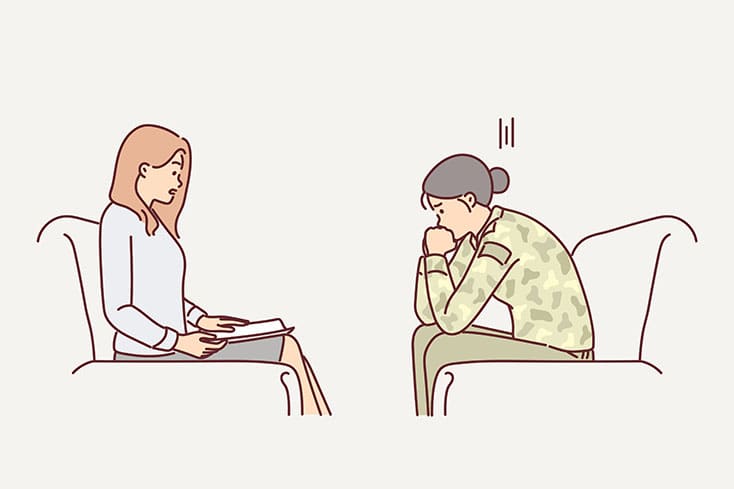June 05, 2023
By Tom Smoot

Many veterans don’t feel understood by people who haven’t served, but I am determined to bridge this gap.
My Army career was a whirlwind of near-constant deployments, a suicide attempt and a diagnosis of post-traumatic stress disorder (PTSD). When I left, I connected with fellow veterans through Wounded Warrior Project® (WWP) and became aware of the need for more open conversation about invisible wounds.
Not only would such conversations encourage more veterans to get the mental health care they deserve but could also help them feel more understood by their neighbors, colleagues and community. My desire to help — and willingness to share my story openly — is how I stumbled onto the path of advocacy.
When I joined the military, I gained a sense of identity. I was part of something bigger. I dedicated every waking minute to a higher calling. But when I transitioned out, I felt a void. I was free to be whomever I wanted, but I needed to figure out where to begin.
I got involved with WWP and other organizations because I realized my need for a support network of fellow veterans. I found inspiration and comfort among others who understood my struggle. Eventually, I felt ready to admit my truth out loud. That moment changed me.
I’ll never forget the reaction when I first shared the story of my suicide attempt. I was at a running event with fellow veterans. At one point in the conversation, I felt comfortable enough to admit to having made a suicide attempt in the past. At first, everyone was silent. No one knew what to say. Even though research estimates we’ve lost nearly four times as many post-9/11 veterans to suicide than combat, it was still incredibly scary to talk about openly.
It took weeks for someone in that group to say anything. When a fellow veteran did, it was a message of encouragement; he suggested that I offer my story to more people to help normalize talking about veteran mental health and wellness. He helped me see that my experience may differ from most people’s, but that didn’t mean I was alone.
Helping others feel less alone was just the start. Sharing my story became a way to help build more understanding around mental health and the veteran experience, especially since only about 7% of Americans have served in the military.
Many veterans I know have started pulling away from the civilian community. I isolated during the early chapters of my PTSD, so I know the feeling. Many of my friends don’t want to deal with the stereotypes or assumptions people might have about veterans. Seeing others minimize their military service due to fear left me wondering, “How do I make this better for even one person?”
My willingness to talk openly about my experience evolved into a quest to bridge communication gaps between civilians and my fellow veterans living among them. I focused on my local community in New York City. Being an engineer, I wanted to solve all the problems everyone was facing. Sometimes, I would almost get carried away. I’ve learned that this work requires “putting your oxygen mask on first” before helping others; self-care is part of the advocacy equation.
This year, my advocacy reached new heights when Wounded Warrior Project invited me to Washington, DC, to meet with members of Congress as part of Operation Advocacy. I felt back in my element. As an Army Civil Affairs officer, I used to walk villages, helping mediate between the military and the community. Now I was walking the halls of Congress, helping educate policymakers on ways to help those who have served. Without the support of a larger advocacy organization like WWP, people like me would struggle to get in front of policymakers. I’m grateful for how they empower veterans to advocate for each other.
Continuing to give a voice to veterans and their needs makes me excited about the future. Thanks to support from my peers, and organizations like WWP, there’s a voice in my head that continues to grow stronger: “Keep going. Keep sharing your story.”
It is amazing how much can come from learning to speak up for yourself. You can discover meaning in the pain and challenges of the past. When I first left the military, I wanted to prove I was not broken. I had no idea then that the things I felt ashamed of would become such a public and meaningful part of my purpose.
Tom Smoot is a U.S. Army veteran and founder of Lift and Shift Foundation for New York City veterans. He served as a Civil Affairs non-commissioned officer from 1999 to 2011, helping support special operations forces and foreign national agencies hosting U.S. military operations. Tom resides in New York City.
We’re always accepting submissions to the NAMI Blog! We feature the latest research, stories of recovery, ways to end stigma and strategies for living well with mental illness. Most importantly: We feature your voices.
LEARN MORENAMI HelpLine is available M-F, 10 a.m. – 10 p.m. ET. Call 800-950-6264,
text “NAMI” to 62640, or email. In a crisis, call or text 988 (24/7).